Posts Tagged ‘Spokane’
Christian refugees from Pakistan reunite in Spokane after nearly seven years apart
Arooj Nirmal, left, who came to Spokane in 2017 as a Christian refugee from Pakistan, wipes away tears as she reunites with her husband, Sunny, for the first time in almost seven years on Wednesday evening at Spokane International Airport. He had just flown in from Sri Lanka.
Read the full article here. Story and image courtesy of The Spokesman Review.
What is Resettlement
The Joys and the Challenges.
“The most rewarding part of being a case manager at World Relief is watching the face of a family member reuniting with a loved one — where their whole face demonstrates joy and they embrace each other, having not known for sure whether they would ever be given this chance” – Isabella, Resettlement case manager.
“Of course, like every job, there are challenges — lots of unexpected urgencies and needs to be met. For example, a family’s utilities not working and vehicles breaking down on their way to a doctor’s appointment. In every way, the job requires a heart full of compassion and willing hands and feet to work.”
Staff in the Resettlement department at World Relief list lots of rewards: airport arrivals, family reunifications, citizenship ceremonies, first glimpses of snow, clients receiving much-needed medical care after months/years of waiting, high school and college graduations, friendships forged between people from different parts of the world who seem like they never should have met.
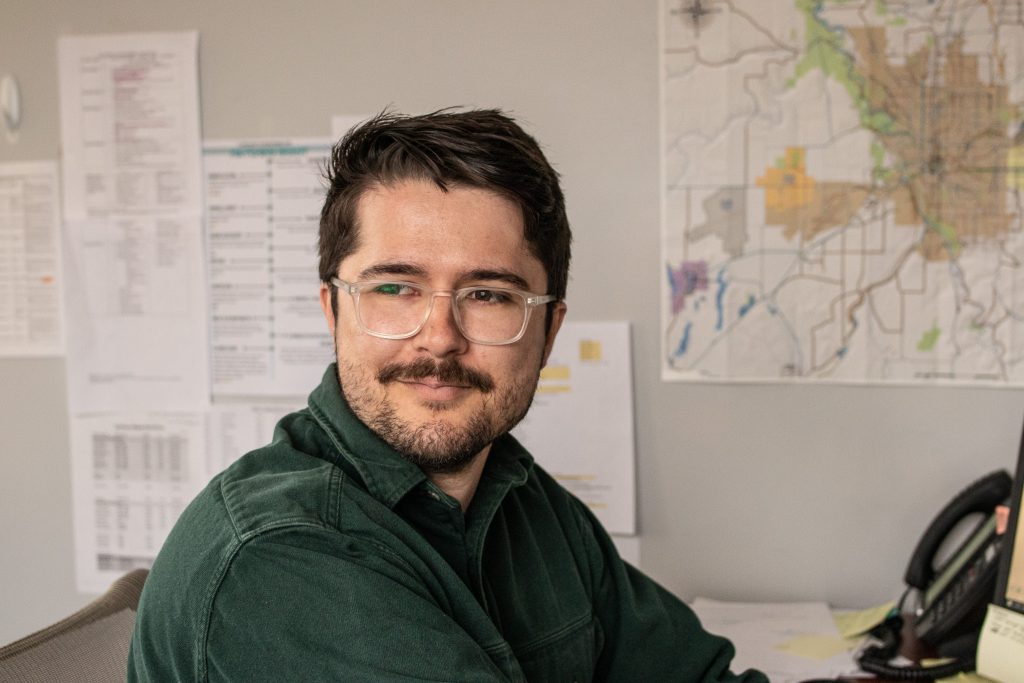
“The work that is done in the Resettlement department is very human,” said Gio, Resettlement Program Manager. “It is done by humans for humans. This human aspect is essential to our jobs and something we highly value. It’s why we are here.”
What can sometimes be missed, however, is the hard work behind the rewards.
“Alongside this very human work is a complex process of documents, contract-regulated timelines, etc. Combine this with the fact that no person’s/family’s needs are ever the same and the local environment in which we work is always changing (think housing, jobs, policies) and a complex process becomes even more complex. Because of this challenging environment, we need the help of the community in Spokane. We need volunteers, landlords, service providers and the community at large to come together to make this happen.”
The work of welcoming people is a community effort. (Repeat those last two words with emphasis: Community. Effort.)
“I would say this work is harder than people realize and better and more rewarding than people realize” – Jordan Bemis, Resettlement Director.
Jordan has been working at World Relief for 12 years, first as an intern, then as a case manager, a pre-arrival coordinator, a program manager, and now as Director of Resettlement and Placement. “The planning, the details, just the amount of work that goes into resettling one family is enormous.”
Pre-Arrival
The work of World Relief Spokane begins with resettlement. Eugenia, WR Spokane pre-arrival coordinator, is notified a few weeks before families arrive. She receives the airport arrival info, the number and ages of people in each family, where they are coming from and whether they have any US ties in the area. She arranges for them to be met upon arrival and transported to their temporary accommodations, which can vary widely – a church basement, an Airbnb, a host home. If the ethnic community has a presence in Spokane, they may be part of the welcome and provide an initial, culturally appropriate meal.
Anzhella, the initial healthcare coordinator, is also working behind the scenes prior to the family’s arrival. She reads the family’s medical records, researches their needs, sets up refugee health screenings, and coordinates healthcare providers for a smooth transition into the US healthcare system. For pregnant women and moms with young children, she makes sure they get set up with WIC. And for elderly patients, she helps them apply for SSI.
“I want to be prepared ahead of time so that families receive the care they desperately need right away.”
Early Days
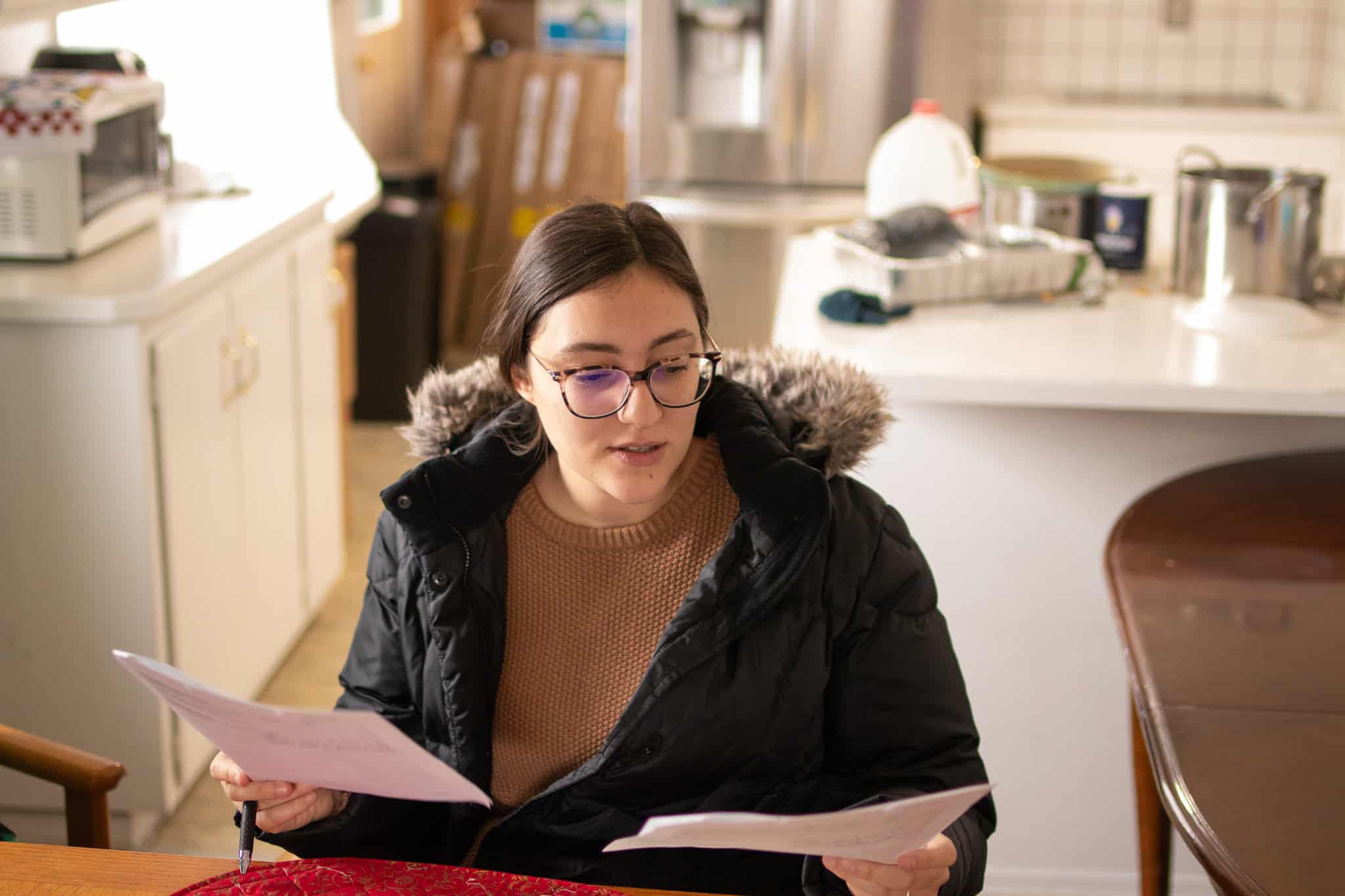
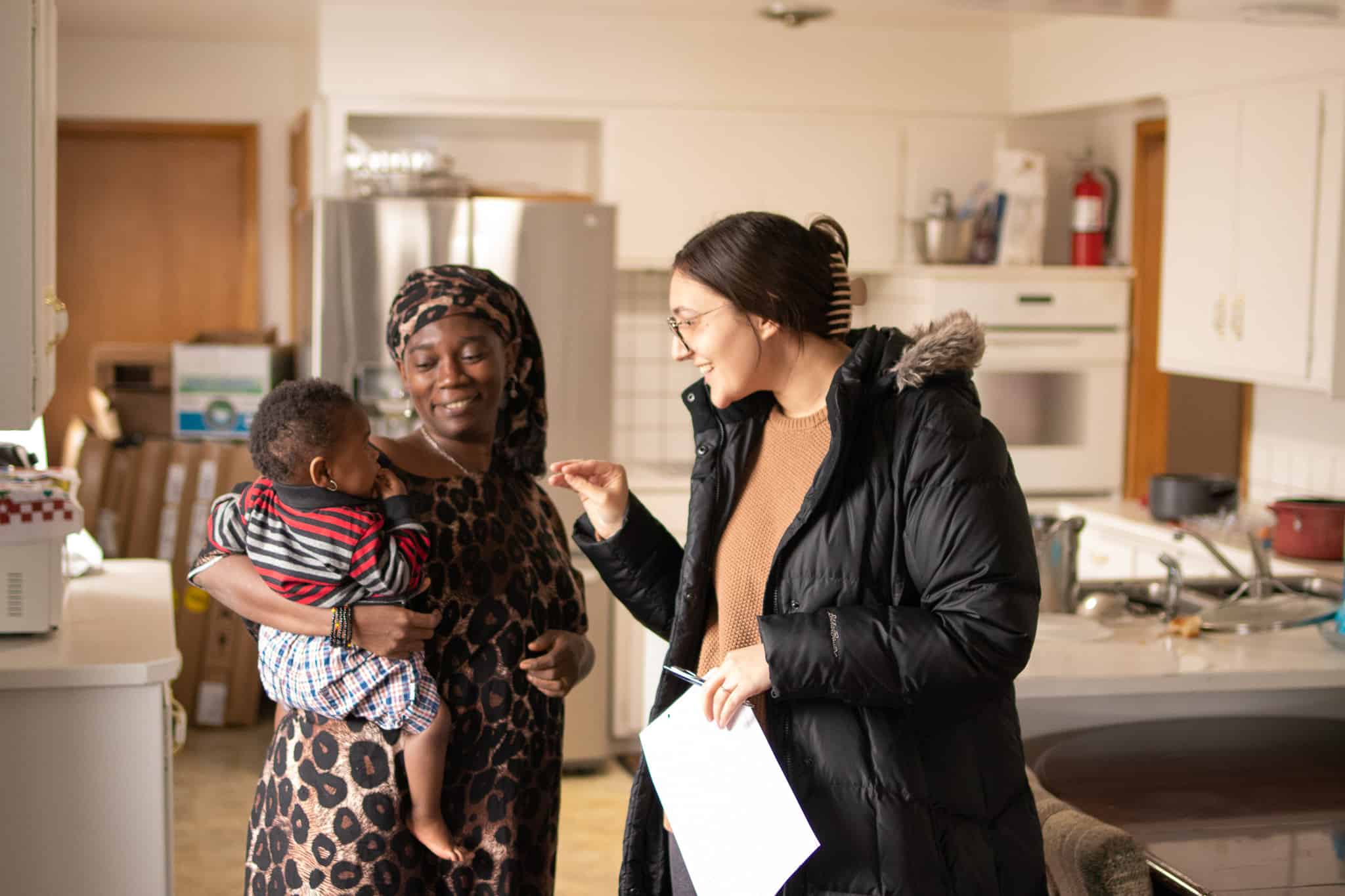
The day after arrival, a case manager visits the family in their temporary home to welcome them and begin the process of establishing roots in Spokane. The case manager explains World Relief’s role and asks questions to better understand the family’s situation and goals. The WR team provide groceries for their first few days and identifies a nearby grocery store for future shopping. Paperwork is signed and next steps identified.
Within the first week, the family comes to the World Relief office for a cultural orientation or, when appropriate, to be interviewed for enrollment in Match Grant. Match Grant is an accelerated option for families with limited barriers to employment and an eagerness to work.
Cultural orientation is meant to give the family a picture of life in Spokane and how it may differ from their previous life. World Relief staff and volunteers teach families about basic laws, resources and benefits, how to use public transportation, health and medical services, family reunification options and more.
Expectations
Part of cultural orientation is also about setting realistic expectations – on both sides. What can the clients realistically expect and what will the landlords and employers they meet be expecting?
Jordan said, “Rumors about the US abound overseas. Refugees hear that everything will be provided for them when they arrive. They will receive a house, a car, they won’t have to work or they will be given the exact same job that they did back home. The reality is that they will have to work really hard, their first living arrangement will be really basic, and they won’t have much choice of where it is.
“We try to frame these conversations by talking about how this is just a starter home, or they just need a starter job to survive. You can literally see on their faces when culture shock sets in, that this isn’t like what they were expecting.
“As a staff, we have to remember that every refugee has experienced trauma; through fleeing their country and their individual experiences. Some respond to these new situations out of frustration and can be pretty thankless. But no one on our staff took this job to be thanked. We took this job because we know welcoming the stranger is the right thing to do. It is an act of justice and of mercy.”
Getting Settled
Eugenia works closely with Erika, WR housing coordinator, to determine when a family will be able to move from temporary to permanent housing. Erika works with landlords to find permanent housing for our families. She may have to call 50 different landlords to arrange for four viewings, and from there, she may or may not locate an appropriate rental.
“About ten percent of the landlords respond to my inquiries, and only about two percent of the contacts end up being a successful resource. Refugees don’t have Social Security numbers when they arrive. They don’t have work authorization for the first 6 weeks. They don’t have a credit score, co-signers or a driver’s license – all of those are vital when applying for housing.”
Jordan says finding housing is the single most difficult part of Resettlement.
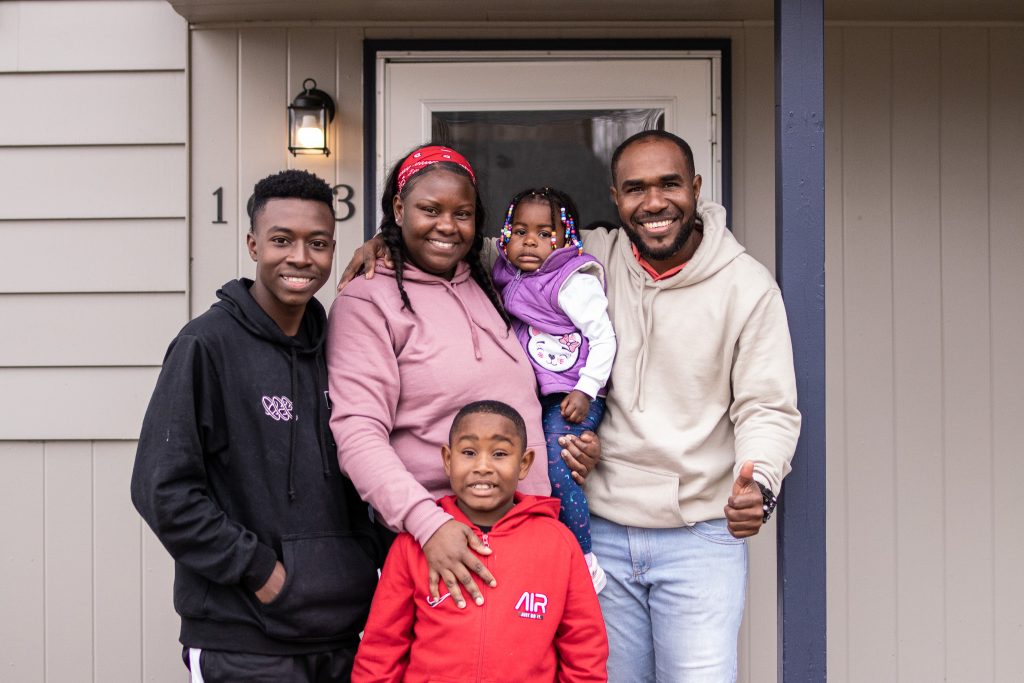
The current rental vacancy in Spokane is about 4.7 percent, up from a few months ago, but still tight.
“Just finding available housing is difficult,” Jordan said, “and then to find landlords willing to rent to refugees who don’t have a job yet and no rental history here. It is a bit of a leap of faith on the landlord’s part, and mostly, it is done because we have built relationships over the years with them.
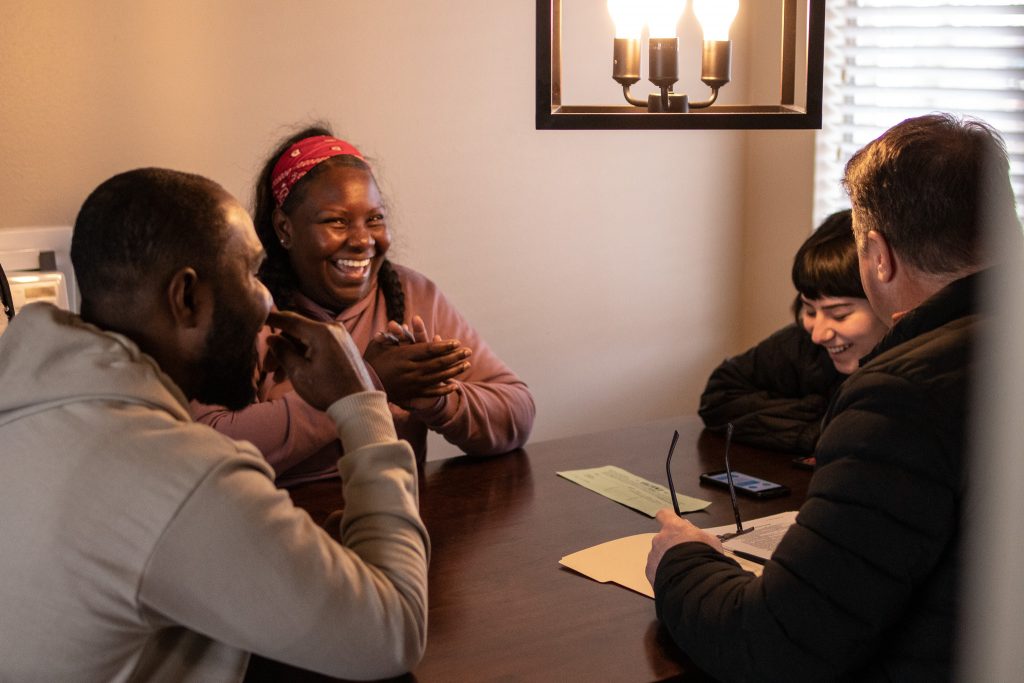
“Ongoing housing has definite challenges. We have refugees coming from dozens of different countries and cultures, and each family is different in terms of their experience with housing and the amenities they have had. We have families who speak amazing English when they arrive and who have lived in better homes than I have. They already know how to use all of the appliances. Then, we have families who have been stuck in a refugee camp for possibly decades, and we have to start from the beginning: how to use a key, how to use the stove, how to store food properly, how to keep water in the tub by using a shower curtain, and how to flush toilet paper and plunge a toilet. This family also may not speak English, but they may speak like five other languages.”
90 Days
Resettlement is all about the first 90 days – getting a family settled and off to a promising start.
“Case managers teach them how to pay their rent, help them understand how to budget, how to get a check or money order and how to send mail. I have demonstrated many times how to lick an envelope. All of this takes time and each family is different in how quickly they pick things up.”
Case managers in Resettlement also connect clients with specialists in the Economic Empowerment when they need assistance in finding jobs or with case managers in Intensive Case Management for those who need longer term assistance because of additional barriers.
End Results
After 12 years, Jordan perhaps sees the big picture clearer than anyone: “I get to tell people about the best parts of my job, like going to the airport for a family reunification case where a mom has been separated from her daughter for 12 years or a spouse has been separated from her husband for seven years. Many, many smiles and tears.
“I absolutely love enrolling kids in school and taking them to their school to take a tour and meet their teachers and show them how to take the bus the next day. They are shy and nervous and excited and full of thoughts. It’s one of the moments that you see these newcomers start to dream about what a future looks like and what is possible. For many of them, they have been stuck for years with no home and no hope. Resettling to the United States, though it is hard, allows them to dream again.
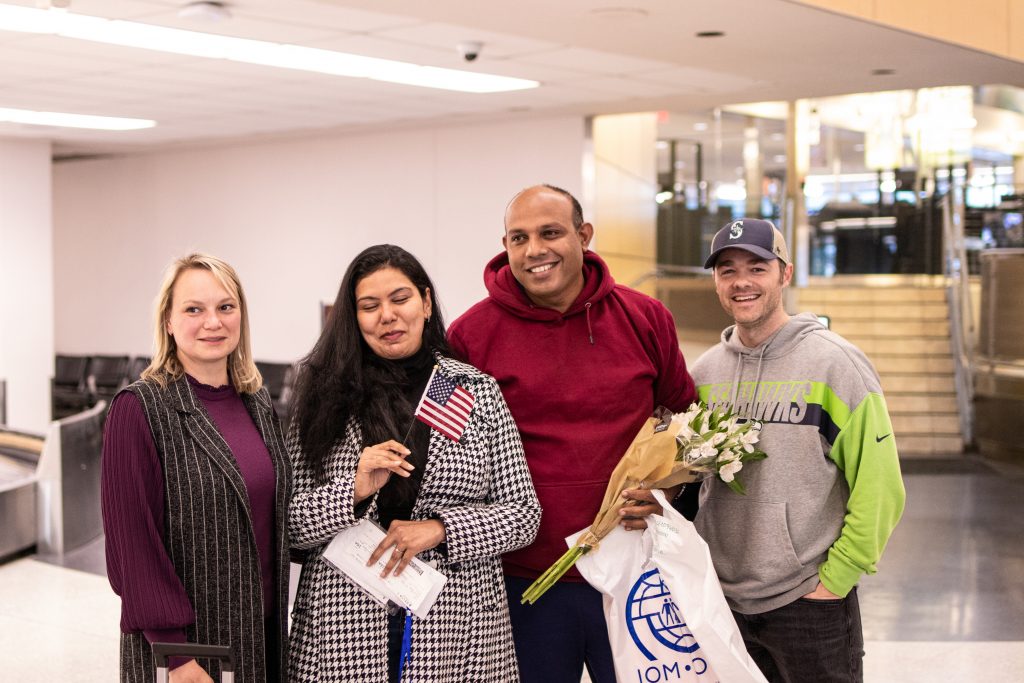
“And the other best part, since I’ve worked here so long, is being able to see the results of the hard work these families put in – the dream jobs they now how, the businesses they’ve started, the kids who’ve graduated college and have their dream jobs and are getting married, the many refugees who have gone through the naturalization process and become citizens. There is something pretty great when you stick around a place for so long and you are able to see all of these families succeed and flourish and become members of the community.”
Want to be part of this welcoming community?
We need you! We need financial partners, volunteers, and people to donate cleaning supplies, hygiene items and gently used furniture. Find out more on our website.
World Relief Promotes Refugee Resettlement Efforts in Spokane and Advocates for Greater Community Engagement
Matthew Soerens, Vice President for Advocacy and Policy at World Relief and coauthor of Welcoming the Stranger: Justice, Compassion and Truth in the Immigration Debate will visit the organization’s Spokane location this Wednesday and plans to speak at a number of scheduled events in the area. Soerens hopes to encourage the local community to extend greater support to vulnerable immigrants and refugees.
On March 15, Soerens will lead a Lunch and Learn event at the Spokane Public Library from 11:30 am – 1:00 pm. Registration for the event, “Building Communities of Welcome,” is open to the public and will be centered on exploring God’s heart for immigrants and refugees and how communities can participate in providing resources and support that help them settle into their new homes.
“Throughout Scripture, we see repeated proof that God cares uniquely for the vulnerable and the stranger. As refugees continue to join our communities, our interactions with them are an opportunity to reflect God’s heart,” said Soerens. “At World Relief, we have seen time and again refugees’ greatest need is support as they navigate an unfamiliar culture and seek to rebuild their lives in a new country. For the last 30 years, our office in Spokane has risen up to do just that – and our communities must continue to join in this work as the need for these services continues to grow.”
Soerens will also use his visit to Spokane as an opportunity to speak about World Relief’s ongoing advocacy efforts for refugees and immigrants in the United States. The World Relief Spokane office joins in these advocacy efforts by partnering with local individuals, churches, and communities to welcome refugees, and is encouraged by federal programs like Welcome Corps, recently launched by the Biden administration, that allow for private refugee sponsorship.
“Supportive communities are one of our greatest resources for welcoming new refugees into our state and empowering them to become contributing members of their new home,” said Christi Armstrong, Executive Director at World Relief Spokane. “Increasing refugee resettlement efforts in Spokane is not only a response to God’s call to love our neighbors, but is also an investment in building stronger communities.”
Immigrant women and children gather at Spokane Central Library for International Women’s Day
We were one of many booths at the library, meeting and talking with the women of the refugee and immigrant communities in Spokane, celebrating their strength and dignity. Check out the coverage by KHQ News here.
BEYOND 90 DAYS: Intensive Case Management
By Cade Hajovsky, Fall Intern
What Is Intensive Case Management?
Not all newly arrived refugees can become self-sufficient and independent in 90 days. Many immigrants need more support. Through our Integration and Wellness department, World Relief provides case management to those struggling to get established. Case managers help clients navigate the health care system, legal resources, housing and financial management services, educational services and more. They connect clients with other agencies who provide direct services, while coaching them in accessing services and resources. The goal is to empower clients and connect them with support systems (physical, emotional, social) as they adjust to life in America.
Volunteers can be a significant help in this process by walking alongside families as they figure out their tight budgets, work on their language skills, learn the culture, and build a network of support. They often bring a wealth of experience and knowledge and still report back that they also learned and grew through the experience.
The purpose of Intensive Case Management is to offer services and help from World Relief beyond the initial 90-day resettlement program — up to 5 years after arrival. Intensive Case Management is one of three teams in the Integration & Wellness Department, which serves hundreds of clients each month.
Integration & Wellness
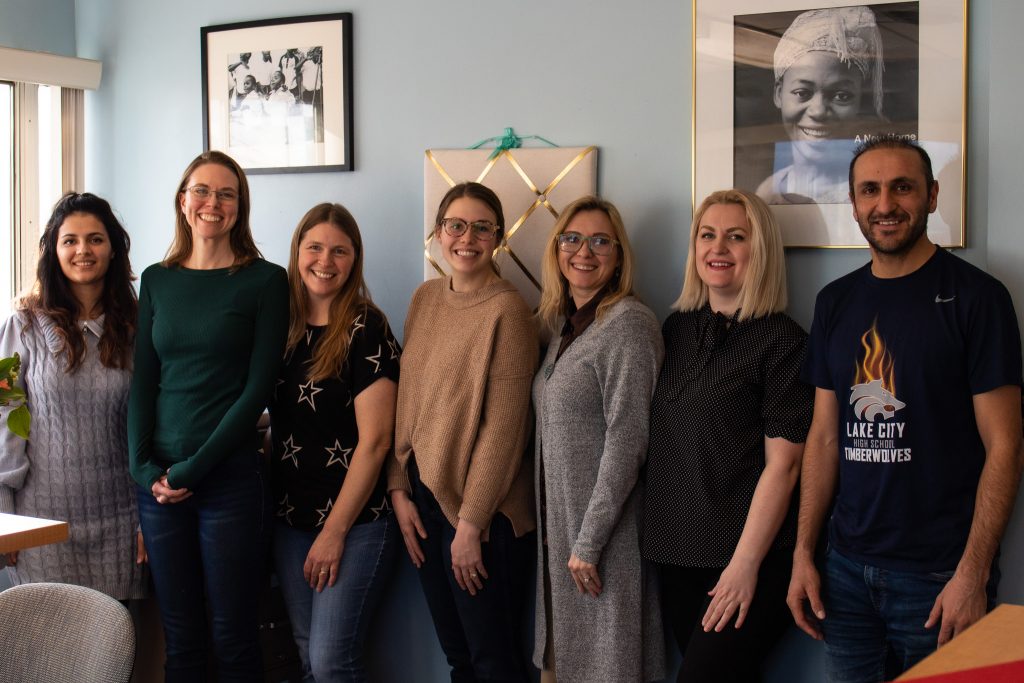
Andrea Simpson, Director of Integration & Wellness, has been at World Relief since 2008. She began her work as a case manager within the resettlement department, worked her way up to supervisor, and now serves on the leadership team. Within her role, Andrea oversees three teams: Intensive Case Management; Education Services and the Friendship Center/Community Ambassador Team. Intensive Case Management encompasses two programs: Preferred Communities (PC) and Promoting Refugee Integration, Mobility and Empowerment (PRIME).
PC is a program that receives federal funding and supplemental state funding. PRIME is funded by the state. Each of these programs consists of employees who work one-on-one with refugees and their families to overcome challenges. Generally, each case manager works with 10-15 clients at a time.
The time that clients stay within Intensive Case Management programs varies, but the goal is to provide support to our new community members for as long as needed. The case managers in the PC program have a 1-2 year track with a minimum of six months. In PRIME, there is no definitive timeline, a refugee could re-enroll every year until they are no longer eligible (five years). This is a rarity, however, as the purpose of Intensive Case Management is to move clients toward self-sufficiency. Long-term engagement generally only happens if there are extenuating circumstances that would cause someone to stay in PRIME for a longer amount of time, typically medical needs.
In addition to the PC and PRIME programs, Andrea also oversees the Education Center. The Education Services team launched last year and is currently hosting small group education classes on finances, computer skills, housing, and more. Morella Perez-Suels, Manager of World Relief Education Services, believes strongly in working to understand the needs of clients first and then craft educational programs to help fill the gaps.
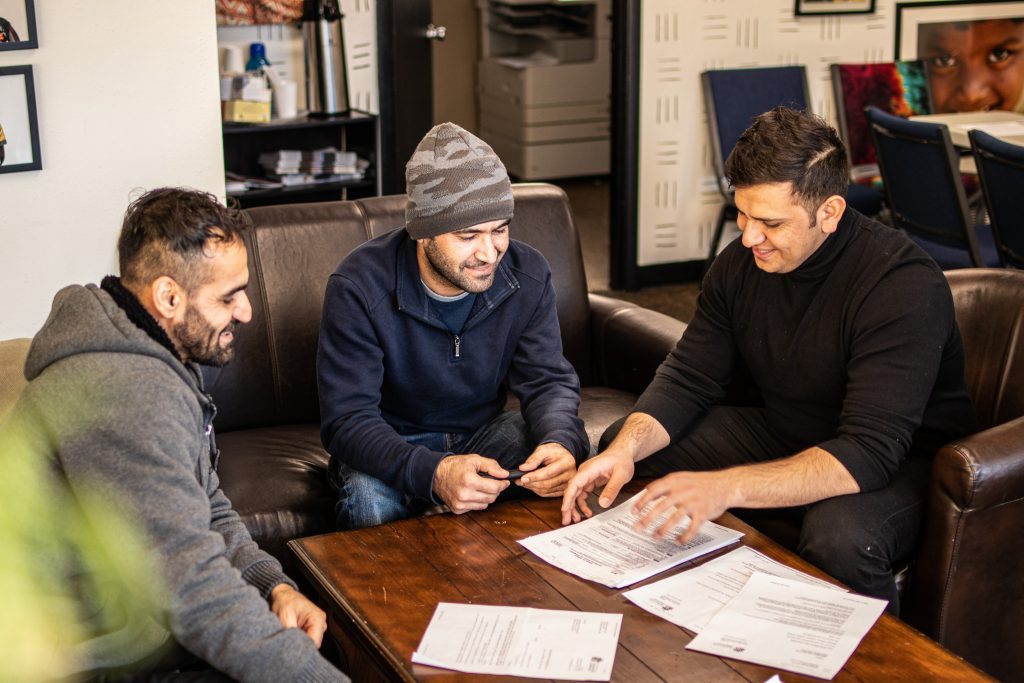
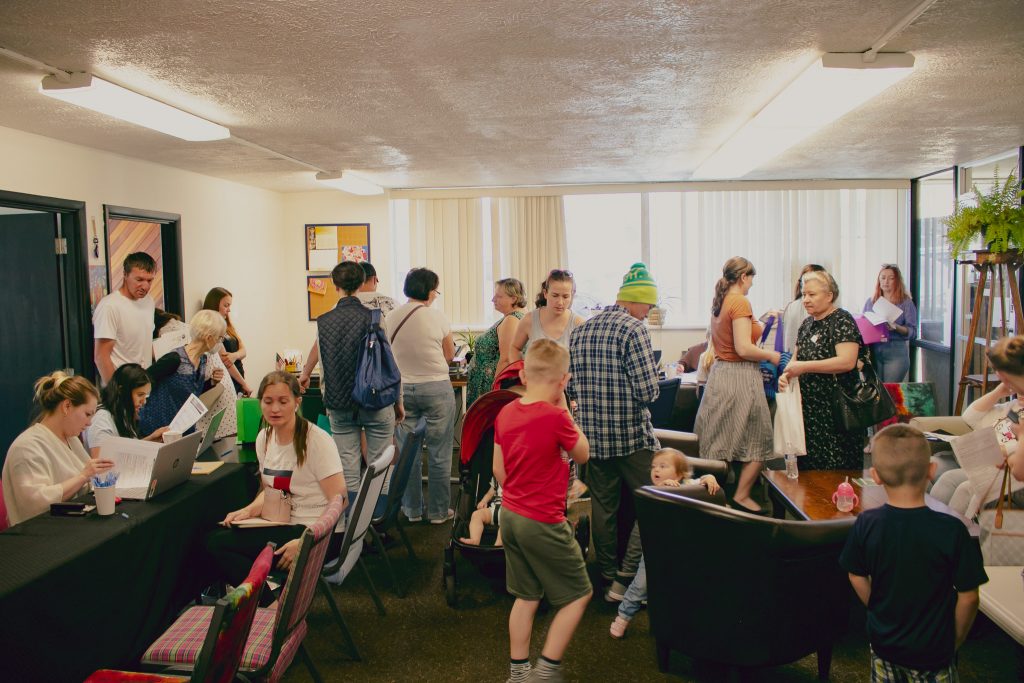
The Friendship Center is home base of the Community Ambassador team, a program birthed during COVID which has become an invaluable means of connecting with the various immigrant groups within Spokane. Community Ambassadors are already leaders within their individual communities, so they can serve as a bridge between World Relief and the various immigrant groups — letting World Relief know about the needs their community is experiencing and relaying word about available resources back to the communities. Ambassadors help in a wide variety of roles — interpreting and translation, helping to fill out paperwork, delivering food boxes, taking children on field trips to the roller rink or Mobius, connecting families with the Farmers Markets, etc. Melissa Stipek, who oversees the Friendship Center and the Community Ambassador program, describes the Friendship Center as “the happy side of World Relief.”
“I believe for people to be able to flourish, they need to be happy. When people are happy, their mind clears, and they are open to new ideas.” — Melissa
Client Challenges
New immigrant families face a host of challenges, such as language, housing, financial management, schooling, transportation, childcare, healthcare. The first focus area of Intensive Case Management is helping families address these obstacles so that they can stabilize and not be in constant crisis. Secondly, they help refugees build a firm foundation and move forward into integration and empowerment.
The top two challenges case managers address are housing and finances.
“When families first arrive, they do not have very many options for housing as they do not have rental or credit history, which often leads to them not getting their ideal housing,” Andrea said. “Also, with housing prices going up, there have been issues with families not being able to find affordable rent.”
Families who arrive through World Relief’s resettlement programs are initially paired with the resettlement teams who diligently work to find them housing. Intensive Case managers get involved with housing later down the line and generally work with families looking for their second home, not their first home.
In addition to assisting with housing, case managers help clients budget, apply for jobs and programs, and teach them how to connect with different resources.
“Intensive Case Management is necessary because if you picked up tomorrow and moved to another country, you would have lots of lessons to learn,” Andrea said. “How do I get a phone? How do I get from here to there? How do I pay for this? What if I want to buy a house? How do I support my children? Everything you want to do, you have to learn anew.”
As soon as they arrive in the United States, refugees are learning how to navigate life in the United States, which includes the need to understand technology. The digital climate of the U.S. requires people to know how to navigate the internet and complete tasks online, such as applying for a job. For someone who has never used a computer before, this can be a very difficult transition. Through the Education Center, immigrants are learning how to navigate the online world.
Through help with housing, transportation, education and finances, the main goal of the Integration & Wellness department is to help refugees gain confidence and get to a point where they feel comfortable navigating life without as much support from World Relief.
Self-Sufficiency
The mission of World Relief is not simply to make sure a refugee is in a home and has a job; it is to walk with them until they are in a position to flourish in their new home.
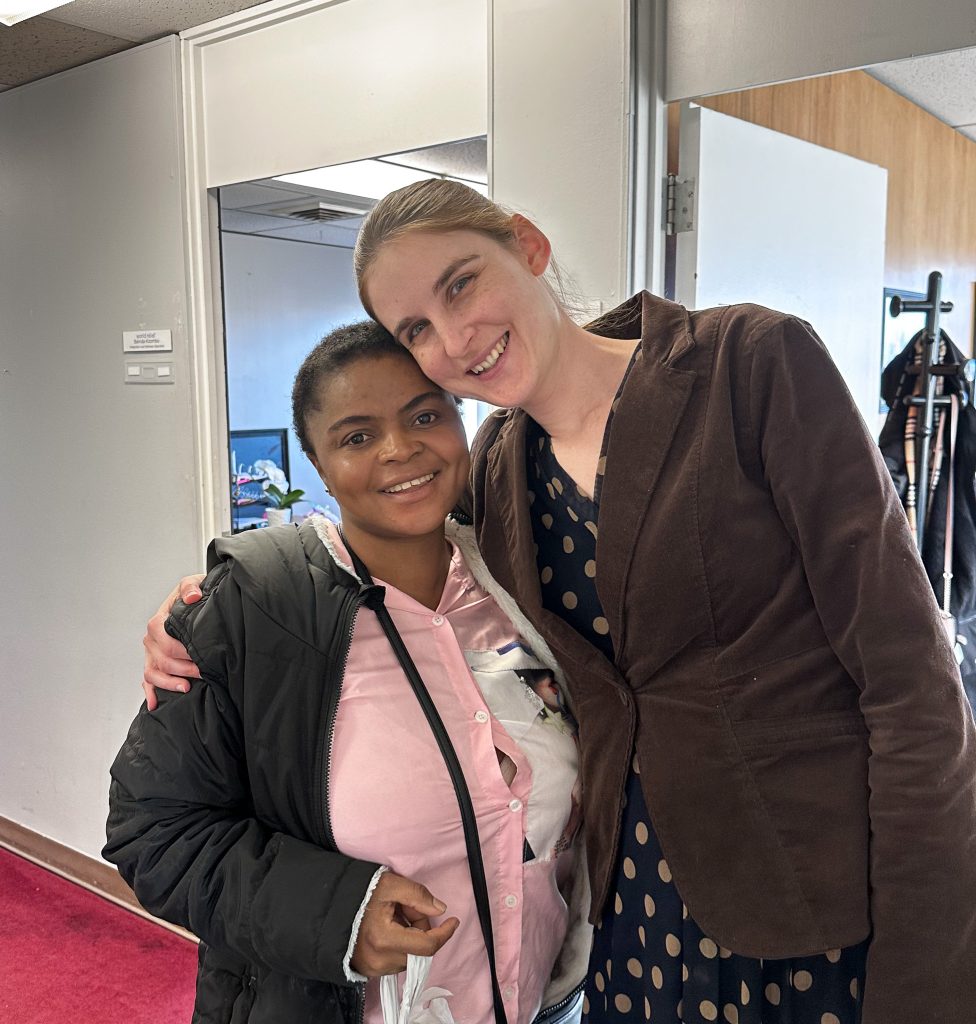
“Integration and Wellness is all about empowerment,” Andrea said. This process is executed through setting goals that help refugees build stability.
While a refugee can enter into Intensive Case Management as soon as their time with the resettlement department is over, this is not normally the case.
“Everyone hits that wall, usually after they have been here for six months, where they say, ‘This is not what I expected,’” Simpson said. “’The people, the food, the housing, the job, it’s not what I expected.”
When this time comes, the Intensive Case Management team welcomes refugees with open arms and works diligently to assist them in their struggles. Stability is not built overnight; it is a process of gaining confidence, skills, and experience that lead to this sense of empowerment for refugees.
At World Relief, we never want refugees to feel alone on this journey. We work to provide them with the resources and connections they need to succeed and feel empowered, and the work of Intensive Case Management greatly contributes to this mission.
Economic Empowerment: Immigration and Jobs
Ronald Reagan once famously said: “The best social program is a job.”
It might be overly simplistic, but he’s not wrong. In our experience, the refugees and new arrivals coming to the United States through World Relief very much want to work. They have come for a better life which includes finding meaningful work. Those coming from refugee camps have not been allowed to work – some for decades – and are eager to use their skills to build a life in their new home.
Jared Booker, Director of Economic Empowerment at World Relief Spokane, described his department’s role like this: “We don’t simply find someone a job. We encourage our clients to dream again. A job can bring dignity, confidence, and the ability to be a positive part of something much larger than themselves. These are all things that have, for the most part, gone dormant within our clients.”
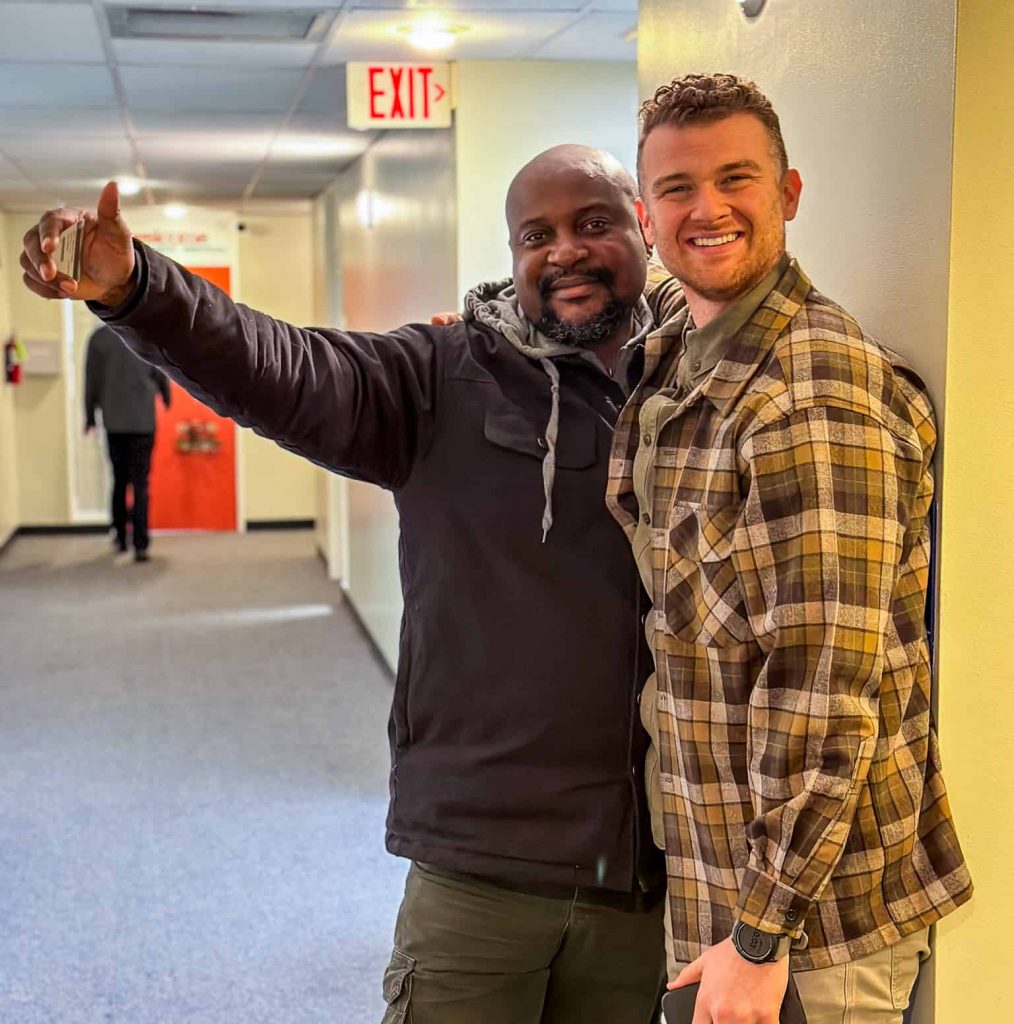
World Relief’s goal is to help each new immigrant family find employment for at least one adult in the first 90 days. The first job may be an entry-level position while the clients work on their language skills, navigate transportation and develop skills. Clients are welcome to come back at a future date when they are ready to pursue a more career-oriented position. Job Readiness Workshops provide clients with information and mentoring on how to find and maintain meaningful employment.
Currently, the workshops run three times a week with different days devoted to different groups of people so that interpreters can be available as necessary. Clients learn both soft and hard skills – matching your skills to a job, goal setting, resolving conflict, teamwork, interviewing, etc.
Economic Empowerment specialists each carry a workload of approximately 60 people with whom they are working to find employment. Specialists interview clients, manage expectations, help with resumes and applications, set up interviews and coach/encourage clients along the way. They work with a variety of employers from manufacturing to hospitality: HDT Global, Starbucks, Panda Express, Davenport Hotels, and K-L Manufacturing, to name a few.
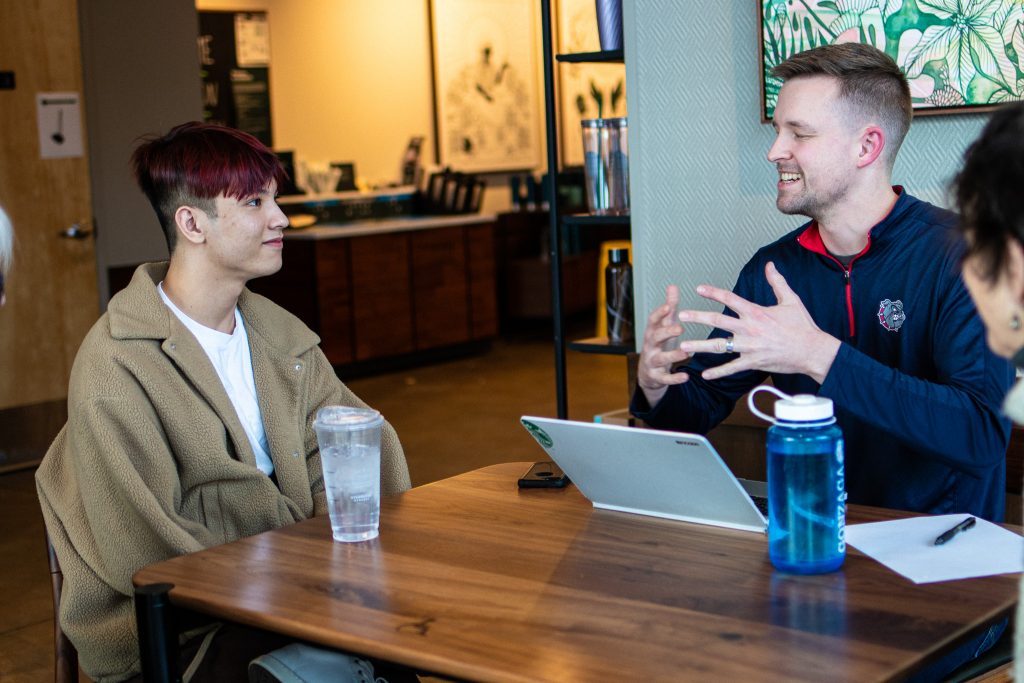
Two-Way Benefit
Sometimes people use employment issues as an argument against immigration: “They’re taking our jobs.” Or… “They’re just going to end up on welfare and drain all our resources.”
The facts, however, do not support either claim:
According to Labor Secretary Martin Walsh, “We don’t have enough workers in the United States of America to fill all the job openings that are out there… The threat to the American economy long-term is not inflation, it’s [about] immigration. It’s not having enough workers… America has always been a country that has depended on immigration.”– Wall Street Journal
“While the perception persists that people migrate to milk America’s social safety net, the reality is that almost all immigrants come to the United States to work. Immigrants overall are significantly more likely than native-born US citizens to be employed.” – Welcoming the Stranger
World Relief’s Jared Booker put these facts into context: “We don’t buy into a sense of employment scarcity. A job for a refugee or immigrant is not one less slice of the pie for you or me. The reality is that, as we welcome newcomers, newcomers also know how to make pie, and there’s more pie for everyone.”
Enriching Our Lives
“They are enriching our lives and expanding our understanding of others.” – Jayne McLaughlin
One local employer discovered that new immigrants not only make great employees, they add unexpected value.
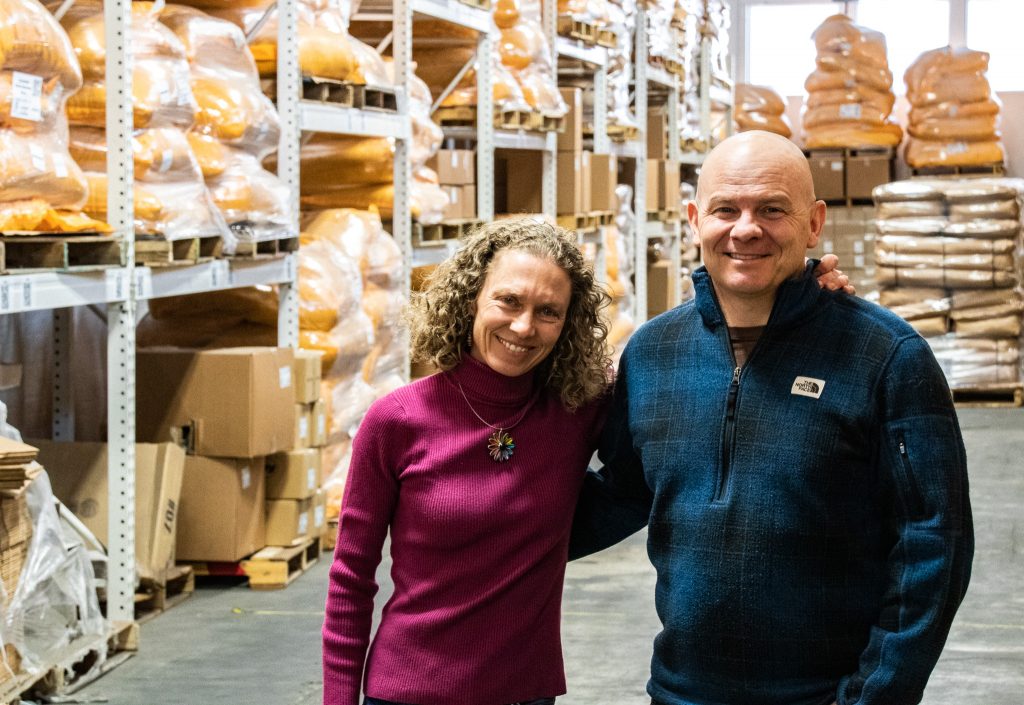
Executive Director Christi Armstrong, who started her career with World Relief in 2013 with the employment department, remembers her first encounter with Waterglider:
“When I got my first clients on my caseload, they were all single Sudanese men. My job was to help them find jobs. I was looking at the WorkSource website, and I saw this opportunity for Waterglider.” Little did she know what a great partnership was about to begin. “The interview was very short. Sean really liked the guys and hired the two of them together to start working production at Waterglider.”
From then on, “They called me whenever they had positions,” Christi said. “We would do whatever we could to bring other Sudanese people to them because of the language barrier. Gamar and Ibrahim had learned a little more English by then, so they would be able to train other people.
“I think what I love most about Sean and Jayne is that they saw these guys – not as a deficit because of the language barrier but as assets because of their work ethic. They’re just go-getters. They came here to work. They came here to get a better life. Sean and Jayne picked up on that really quickly and so they were more than willing to give them a chance.”
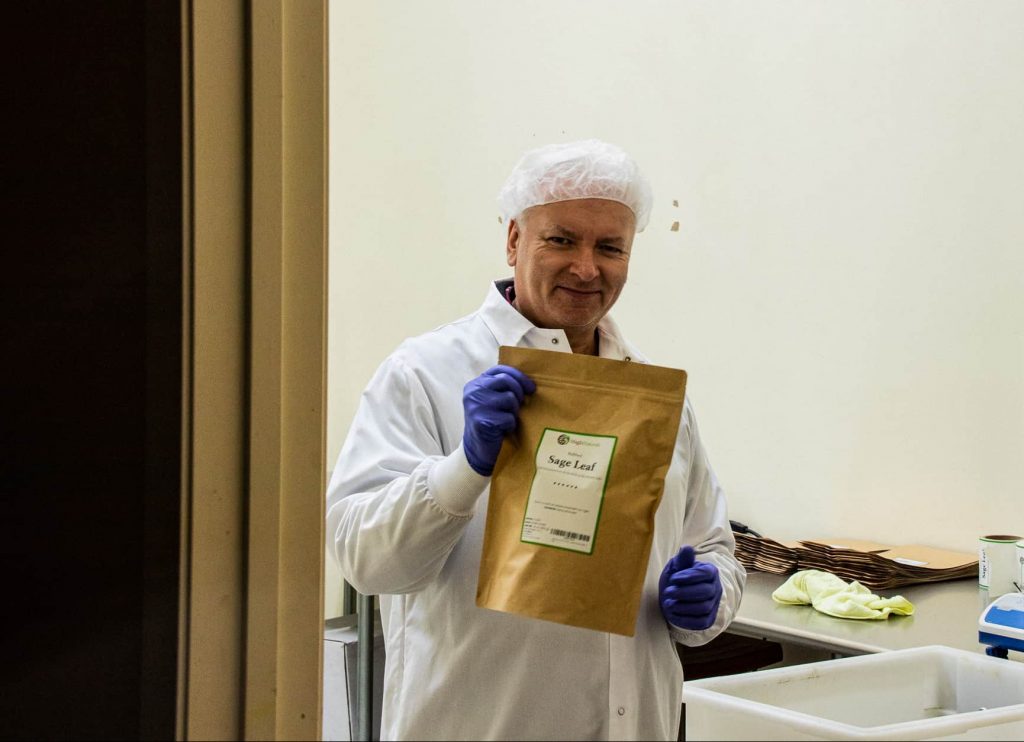
Sean and Jayne are still hiring refugees. Currently, they have two employees from Ukraine, one from Thailand, one from Burma and Rose, from Burundi, who makes all of the bath bombs.
“All our refugee employees have been really hard-working, very nice people, very grateful, sincere, friendly, nice to have around,” Jayne said. “They are enriching our lives and expanding our understanding of others.”
Best friends help refugees amid war…
“Despite Russia being at war with Ukraine, two best friends from each country have a deep understanding for each other and work each day to achieve one common goal.”
Read the full Channel 4 KXLY story.
5 Things You Should Know About the Earthquakes in Turkey and Syria
Early in the morning on February 6, massive earthquakes hit Turkey and Syria. For many of us who live thousands of miles away from the devastation, it can be hard to imagine the profound scale of loss — and even harder to know how best to respond.
And yet, if you’re like us, your faith compels you to respond.
At World Relief, our mission is to empower the local church to serve the most vulnerable. When natural disasters like this one occur, those who are already in vulnerable situations are put at even greater risk. By responding together, we can extend the love of Christ to those who are suffering in their greatest time of need.
That’s why we’ve shared five things you should know about what’s happening in Turkey and Syria, why we at World Relief are responding and how you can join us in praying for and serving those who are suffering.
1. How widespread is the impact of the earthquakes?
The earthquakes struck in the early morning hours in a region that has not experienced a major earthquake in over 200 years, leaving residents little prepared. As a result, the devastation has been widespread and severe.
At the time of writing, an estimated 36,187 have died in Turkey and more than 5,800 in Syria — and these numbers continue to rise. More than 5 million people across Syria are now in need of shelter while nearly a million more men, women and children are now homeless in Turkey as a result of the earthquakes. Basic infrastructure, including power and water, has been completely demolished in some areas.
The earthquake’s devastation is further compounded by freezing winter temperatures and, in Syria, decades of civil war have left residents especially vulnerable.
2. What are the greatest needs and how is World Relief responding?
As those impacted grapple with freezing temperatures, decimated infrastructure and profound loss and trauma, the greatest immediate needs include shelter, water, power, blankets, non-food and sanitary items and psychosocial counseling.
World Relief is responding on the ground through long-standing, trusted partners, including Tearfund Germany and the Integral Alliance. Our partners are connected with local churches and organizations in Turkey and Syria who can more quickly deliver aid — especially in hard-to-reach regions or where international aid may be restricted by governing authorities due to protracted conflicts.
Our local partners are working especially hard to provide assistance to the most vulnerable, including the elderly, children and persons with disabilities.
Thus far, our response efforts have included:
- Establishing mobile kitchens and distribution centers for food, water, hygiene supplies, emergency shelter, heaters, batteries, tools and more
- Operating mobile hygiene trailers that offer toilets, showers and washing machines
- Facilitating a kids club and trauma counseling center for children impacted by the disaster
- Providing mobility devices such as wheelchairs, protheses and walkers to those who need them
To stay up-to-date on how we’re responding to this and other crises around the world, sign up for our mailing list, here.
3. What will happen after the initial response?
Natural disasters on the scale of what we’re seeing in Turkey and Syria affect every facet of life. Responding immediately is essential to ensure the survival and safety of as many people as possible. At the same time, we at World Relief understand that rebuilding and restoring what has been broken — whether infrastructure or lives — takes time and commitment.
That’s why we’re beginning conversations with our trusted partners in the region to determine how we can best come alongside local communities so that they not only survive the current crisis, but can flourish and thrive in the future. In places like Syria, which have already been wracked by unimaginable conflict and loss, this commitment is all the more important.
4. Has World Relief worked in the affected region before?
Yes! World Relief formerly had programming in both Syria and Turkey which we transferred to our partners at Tearfund Germany in 2019. We continue to have a strong relationship with Tearfund Germany, allowing us to respond quickly and effectively through our partners who are still at work in the region.
Additionally, World Relief has been helping Syrian refugees resettle in the U.S. for over a decade. Members of the Syrian community in the U.S. have become our coworkers, neighbors and friends. We are grieving and praying alongside them at this difficult time.
5. How can I help?
- Pray: As in all things, we first turn to prayer. Pray for those who are still missing to be found, for the injured to be healed, for the hungry to be fed, for the cold and weary to find shelter and for the grieving to be comforted. Pray also for those responding to do so with wisdom and endurance.
- Give: You can rush help to Turkey and Syria by giving today. Your donation will support our partners at work in the region, ensuring more help can reach more people in this time of great need.
- Share: As the news cycle moves on to the latest headlines, you can help keep Turkey and Syria in the prayers of your friends, family and neighbors by sharing what you’ve learned in this blog.
One Year Later: Erika’s Story
When Russia invaded Ukraine in February last year, Erika Symonenko was working as a salesperson for a garage door company. “I went to Germany right after the war started to help some of my family members [who had fled Ukraine].”
When she got back, however, she was desperate to do more.
Being Part of the Solution
“I couldn’t focus at my old job. I was not able to work. My co-workers understood that I will not be able to focus or do anything unless it’s involved with helping refugees… All I could do was check the news, and I knew that I shouldn’t, but I have to know what’s happening, so I kept checking the news and I want to help. The worst feeling is that you are safe when your friends and your church and your family are getting bombed. You’re feeling guilty. So it was a very depressing moment, and the first thing that comes to mind is the only way that you will be able to help is when they start coming here. So when people start coming here, World Relief is going to be the first to respond.”
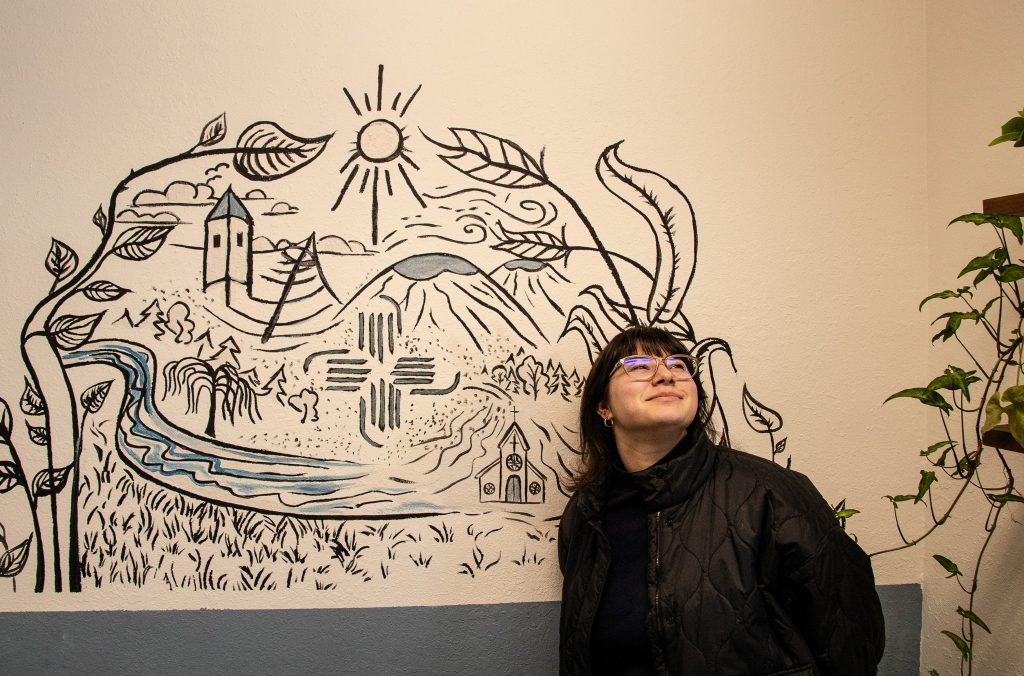
Erika decided she needed to get a job at World Relief. Her old employers offered her a raise to get her to stay. “They would have paid me more than I get here, but in the end, this is what I needed to do.” She started as the housing specialist in April of 2022 .
“The worst feeling is that you are safe when your friends and your church and your family are getting bombed.” – Erika
Immigration in 2008
Erika herself came to the US from Ukraine with her family in Summer 2008. Her story reflects the longstanding, complicated relationship between Russia and Ukraine.
Her family’s church, Irpin Bible Church, was very involved with the Orange Revolution in 2004, a peaceful revolution to protest the fraudulent presidential election in the same year when the Russian-backed candidate (Viktor Yanukovych) was awarded the presidency even though his opponent (Viktor Yushchenko) had received the majority of the vote. Irpin Bible Church, located only 20 miles from Kyiv, provided food, tents, coats, a place to sleep and other resources to the protestors.
“During the whole situation,” Erika said, “we would often be without light or heat because that would come from Russia. They would cut off our resources. We couldn’t do homework. We had to use candles.”
Yushchenko, whose campaign color was orange, was eventually awarded the presidency in a recount in early 2005.
“The protests of late 2004 initially succeeded in preventing Kremlin-backed candidate Viktor Yanukovych from stealing the Ukrainian presidency and made possible the election of his reformist rival, Viktor Yushchenko. However, Yushchenko soon found himself beset by infighting and was unable to lead Ukraine decisively towards Euro-Atlantic integration during what proved to be a hugely frustrating five-year term in office. This paved the way for Yanukovych to mount an unlikely comeback and win the 2010 presidential election race.” (Atlantic Council website)
Erika’s parents became very concerned about their children’s future. “They realized there will be no future for their children to build, and since it is so difficult to get an education and get it transferred to America, they decided they will move here (to the US) as soon as possible.”
Another significant factor in their decision to immigrate to the US was the fact that Erika’s youngest brother has cerebral palsy. “They had friends in Germany and several other countries, but America is the number one country for people with disabilities, so my parents decided it is best. There is so much he receives here that he would not have gotten in another other country.” (Erika’s brother is 21 now and attends Spokane Community College.)
A Rough Start
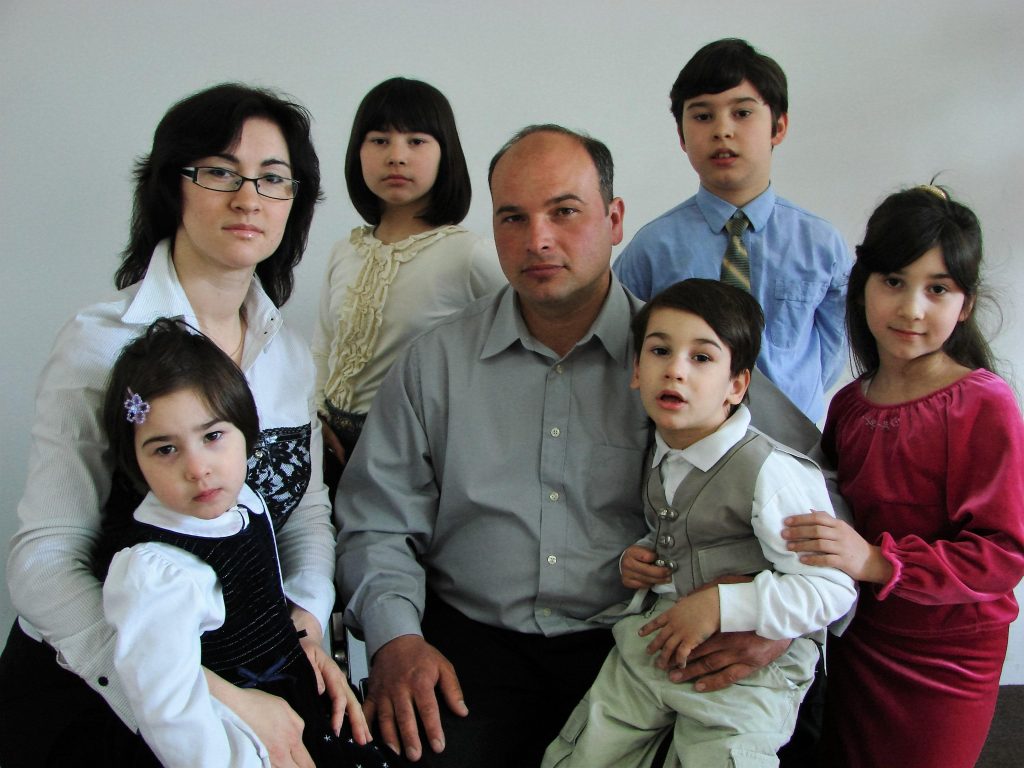
Erika was 11 when they arrived. “They put me in 7th grade because there was lots of confusion… They give me my class schedule, which I had no idea how to navigate, and for some reason, there was no one to go with me to the school, so they just randomly put me in class, and the lady who was supposed to help me navigate the first couple of days, she had her Spanish dictionary with her, and she kept pointing at it, and I would just ignore. And she thought that maybe I was just very traumatized or something, and I can’t respond, but within a couple of days, she realized that I just honestly have no idea what’s going on, and she got really upset and angry, and she kept pointing fiercely in the dictionary, trying to figure out when my birthday is and things like that, and why am I not putting my name at the beginning of the worksheet paper. Later, I found a Ukrainian boy, and I asked him to come up to her and tell her that I don’t speak Spanish, and even though I have dark hair and dark eyes, it doesn’t mean that I am Hispanic.
“We laughed a lot about that later, and now, it’s an ongoing joke, but it was very stressful at the moment.”
According to the Spokesman Review, before the war started, there were roughly 30,000 Ukrainian Americans in Spokane County, the vast majority “Christian refugees who immigrated to the U.S. to escape religious persecution.” A second article estimates 2,500 more have arrived since the war began.
New Arrivals
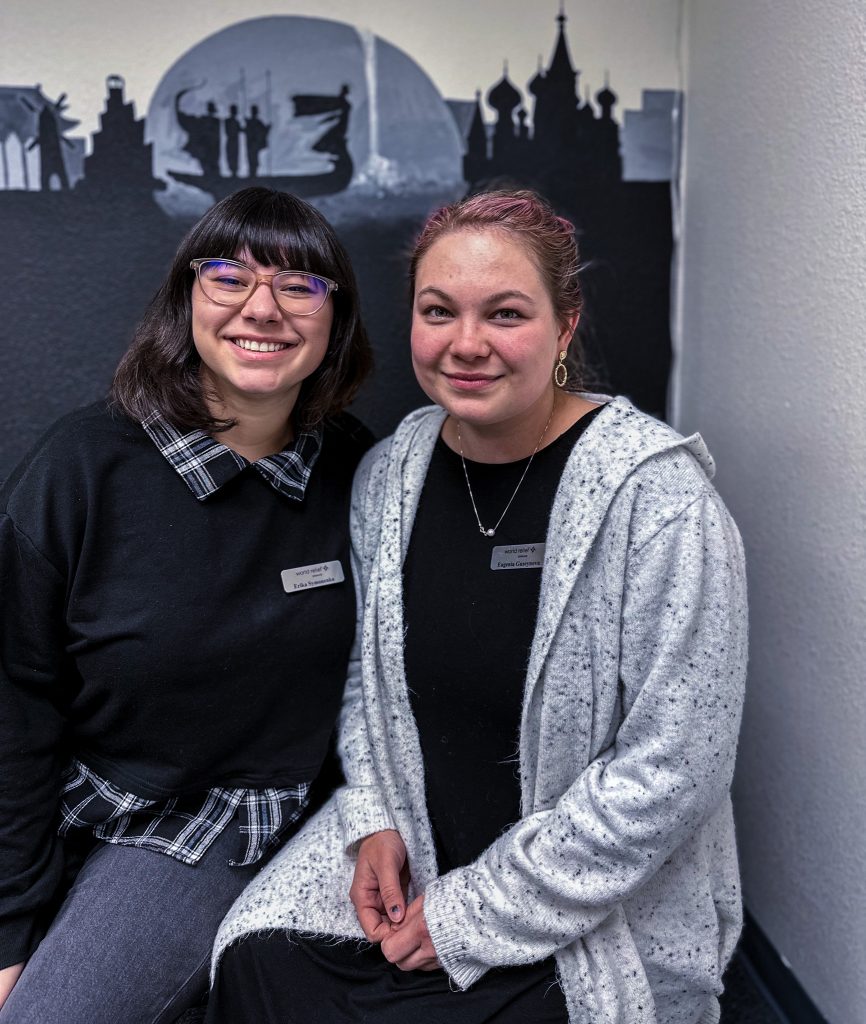
At World Relief, Russian-Americans and Ukrainian-Americans work side by side without conflict. Erika’s roommate, Eugenia (pictured right), is from Russia and also works at World Relief as the pre-arrival coordinator. She knows who is coming when and arranges for each new arrival to be greeted at the airport.
World Relief is able to help the newly arriving Ukrainians with job search, employment and housing stabilization.
“They are also coming here to get information and education,” Erika said, “because everyone when they hear the word ‘refugee’ in Spokane, the first thing that comes to mind is World Relief… Our signs says, ‘help the vulnerable,’ and they don’t have to be registered with World Relief to be vulnerable. Lots of Ukrainian families that come here, we refer them to resources, explain how to find housing, and in the Friendship Center, they have resources.”
Erika has also recruited her mom, Olga, to help as a translator.
“I always wanted to volunteer, but now, it’s time when you need help the most. I see the war in Ukraine; there’s lots of Ukrainian people. I’m trying to help them by myself, but I think it’s just better to join the community who’s doing it right now, and it might help even more.”
*This is what strikes us again and again, with refugees in general, but particularly with the crisis in Ukraine. The Ukrainians who came to the US before the invasion go out of their way to help those who have fled since – going to Mexico to help people cross into the US and register as parolees, taking on private sponsorship, going to Germany and Poland to help people fleeing Ukraine, providing food, water and other necessities to their countrymen as they wait at terminals and temporary shelters. Erika’s mother, Olga, and her sister, who lives in Germany, have been working together since the war broke out to get friends and family first to Germany and then to the US.
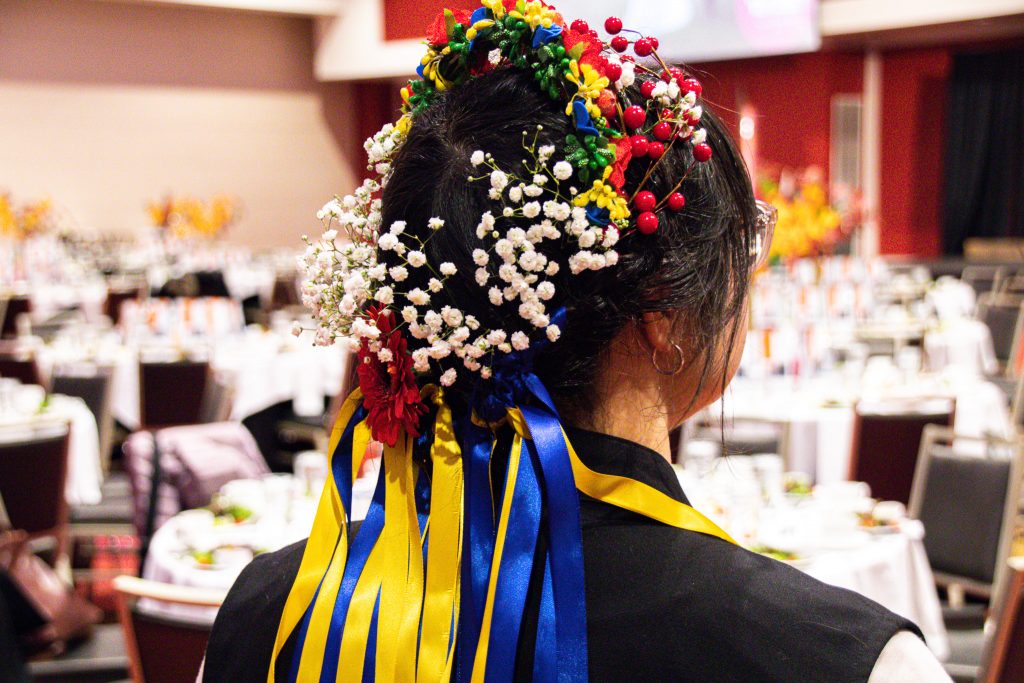
Prayer for Syria and Turkey After Devastating Earthquakes
Join World Relief Spokane in lifting up a prayer for Syria and Turkey. On February 6, 2023, two earthquakes caused enormous destruction. Currently, thousands of people have died and many thousands more are injured or missing. The process of rebuilding homes, businesses, and lives will take many years.
Within our community at World Relief Spokane, this tragedy feels very close to home. One of our staff lived in Turkey for nine years and went to school there. She has friends and family members still living in the region and just visited over Christmas break. We also serve refugees and immigrants who came to the U.S. from Syria and Turkey, leaving loved ones behind.
We know that many of those impacted are among the most vulnerable – some are refugees who fled Syria for Turkey while others are persecuted minority groups or those in poverty.
Recovering from this devastation will be very difficult.
As our community grieves, we invite you to join us in prayer for Syria and Turkey. Thank you for joining World Relief Spokane in asking God to bring an end to suffering and a reign of justice on the earth.
PRAYER FOR SYRIA AND TURKEY
God,
In the face of unspeakable tragedy, the suffering of those in our community, and the destruction and loss of life in Syria and Turkey, we pray what the Psalmist wrote in Psalm 10:
Lord, you know the hopes of the helpless. Surely, you will hear their cries and comfort them. You will bring justice to the orphans and the oppressed.
Comfort the people whose family members and friends have died as a result of these earthquakes. Draw close to them.
Equip believers in Syria and Turkey to show the love of Jesus to their neighbors by helping in tangible ways and sharing the hope of the Gospel.
Inspire generosity in the hearts of people in the United States and across the world, prompting individuals to give the resources and money needed to help communities rebuild.
Empower the Church in America to show radical love for our immediate neighbors who are grieving the loss of life, beauty, and peace in Syria and Turkey.
Let us not turn away, but help us be your hands and feet to love those who are suffering and bear witness to your presence with them.
God, hear our prayer.
Amen.
You Can Help
World Relief is responding to provide immediate assistance through our network of long-standing partners and churches in the region. You can help reach more people in need by responding with us today. Give now to rush help to Turkey and Syria.
Read a press release from World Relief regarding the earthquakes on February 6, 2023.











